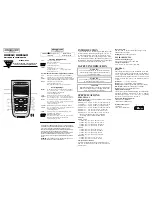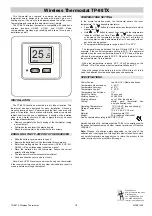
TM 3080-RF
1. Operation and Display
I
Mode button: Press and hold down the button for more
than 3 seconds to open the configuration menu
J
Settting wheel: for making adjustments (e.g. tempe-
rature)
2. Intended use
The wall thermostat is a user-friendly device for pro-
gramming and remotely controlling radio energy-saving
controllers for radiators.
The weekly program (see 8) set at the wall thermo-
stat is adopted by the taught-in radio energy-saving
controllers.
The wall thermostat features an internal sensor for
measuring a room’s temperature and humidity, with the
detected temperature then being transferred to the radio
energy-saving controllers.
System components such as outdoor temperature
sensors, remote controls and window contacts can also
be taught-in to the wall thermostat.
The device may only be operated indoors and must be
protected from the effects of damp and dust, as well as
solar or other methods of heat radiation.
Using the device for any purpose other than what is de-
scribed in this operating manual does not fall within the
scope of intended use and shall invalidate any warranty
or liability. This also applies to any conversion or modi-
fication work.
This device is intended for domestic use only.
3. Inserting (replacing) the batteries
Remove the battery compart-
•
ment cover.
Insert 2 new LR06 (Mignon/AA)
•
batteries into the battery com-
partment.
Reattach the battery compart-
•
ment cover and click into place.
New alkaline batteries have a life of
approximately two years. A battery
symbol (
) will indicate when
the batteries need to be replaced.
Never recharge standard batteries.
Doing so will present a risk of explosion.
Do not throw the batteries into a fire.
Do not short-circuit batteries.
Used batteries should not be disposed
of with regular domestic waste. Instead,
take them to your local battery dispos-
al point.
4. Setting the date and time of day
The firmware version number will be displayed briefly
once you have inserted/replaced the batteries and then
you will be automatically prompted to set the date and
time of day.
Use the setting wheel (D) to set the year (B).
•
Confirm with OK (C).
•
Use the setting wheel (D)
•
to set the month (B).
Confirm with OK (C).
•
Use the setting wheel (D)
•
to set the day (B).
Confirm with OK (C).
•
Use the setting wheel (D)
•
to set the hour (A).
Confirm with OK (C).
•
Use the setting wheel (D)
•
to set the minute (A).
Confirm with OK (C).
•
After setting time and date
the display will then switch
to normal view.
5. Mounting of wall thermostat
The wall thermostat must be mounted in the same room
as the devices, such as radio energy-saving controllers,
window contacts or remote controls, that have been
taught-in to it.
First of all, find an appropriate moun-
•
ting location, making sure that no
electricity or similar lines run there.
Use a pen to mark the bore hole posi-
•
tions (a) of the wall mount on the wall.
If you are working with a stone wall,
•
you should drill the holes using a
5 mm drill. Then insert
a plug into each of the
drilled holes.
If you are working with a
•
wooden wall, you should
drill the marked holes (a) using a 1.5 mm drill.
Now use screws to fix the wall mount to the wall.
•
Slide the wall thermostat down from above onto the
•
wall mount.
6. Operating modes
To switch between the 3 operating modes described
below, press the mode button briefly:
Holiday function
•
( ): Set a temperature that is to be
maintained until a fixed point in time.
Manu:
•
Manual operation – The temperature is set ma-
nually using the setting wheel.
Auto:
•
Weekly program – The temperature is controlled
automatically in accordance with the stored weekly
program.
7. Configuration menu
The configuration menu can be used to modify settings.
To access this menu, press and hold down the mode but-
ton (for more than 3 seconds).
Pro
•
: For setting the weekly program (see Section “8 Set-
ting the weekly program”)
dAt
•
: For modifying the time of day and date
CAL
•
: Time setting for descaling function
dSt
•
: Automatic switchover at the start or end of daylight
saving time can be deactivated.
AEr
•
: For setting the “window open” temperature so that
the temperature is automatically reduced in the event
of ventilation
rES
•
: For restoring the factory settings
UnL
•
: For teaching out all taught-in wireless compo-
nents
Use the setting wheel to select menu items and the OK but-
ton to confirm your choice. Press the mode button again
to return to the previous level. After 60 seconds without
anything happening, the menu will close automatically.
8. Setting the weekly program
The weekly program allows you to set up to 3 separate
heating periods (7 switching times) for each day of the
week. Programming is performed in relation to the se-
lected days, for which temperatures must be stored for a
period from 00:00 to 23:59.
Press and hold down the mode
•
button for more than 3 se-
conds.
“Pro” will appear on the display.
•
Confirm with OK.
•
“dAy” will appear on the dis-
•
play.
The setting wheel can be used to select an individual day
•
of the week, all working days, the weekend or the entire
week (example shows working days selected).
Confirm with OK.
•
Use the setting wheel to set the first time segment
•
(example shows 0:00 to 6:00).
Confirm with OK.
•
Then, select the required temperature for the selected
•
time segment (example shows 17.0°C).
Confirm with OK.
•
Keep repeating this process until you have finished storing
•
temperatures for the period from 0:00 to 23:59.
In Auto mode, the set weekly program is adopted by the
taught-in radio energy-saving controllers automatically
and the temperature can be modified at any time via the
setting wheel. The modified temperature will then be re-
tained until the next program changeover.
9. Weekly program: Examples
The wall thermostat allows you to store up to 3 heating
periods (7 switching times) with individual temperature
settings for each day of the week. The factory setting
consists of two heating phases (from 6:00 until 9:00 and
from 17:00 until 23:00 respectively) for every single day
of the week:
From 00:00 to 06:00 17.0°C
From 06:00 to 09:00 21.0°C
From 09:00 to 17:00 17.0°C
From 17:00 to 23:00 21.0°C
From 23:00 to 23:59 17.0°C
To represent the switching periods, the display shows
bars for every other switching interval. In this examp-
le, no bars are shown for the interval.
If a room also needs to be heated at around noon, the cor-
responding program might look like this:
Monday to Sunday
From 00:00 to 06:00 16.0°C
From 06:00 to 09:00 22.0°C
From 09:00 to 12:00 17.0°C
From 12:00 to 14:00 20.0°C
From 14:00 to 17:30 17.0°C
From 17:30 to 23:30 21.0°C
From 23:30 to 23:59 16.0°C
If you have a home office and only want it to be heated
during the day on working days, you can program the fol-
lowing times:
Please read this manual carefully in order to help you put
the device into operation. Keep the manual handy so you
can refer to it at a later date!
A Switching periods set within weekly program
B Time & date indicator, indoor-humidity (% RH) & tem-
perature, indoor- and outdoor-temperature, outdoor-
min- & max-temperature; functions
C Holiday function ( ), manual operation (
Manu
), au-
tomatic operation (
Auto
), “battery empty“ symbol
(
), set-back/comfort temperature (
), “window
open” symbol ( )
D Display button: Switch between display modes (e.g.
time & date or indoor-humidity & -temperature)
E OK button: For confirming/saving, teaching in
F Current temperature setting, functions
G Day of the week
H
-button: For switching between set-back and com-
fort temperatures
5
2
6
3
7
4
8
A
B
C
D
E
I
F
G
J
H
a
a
A
C
B
D




















